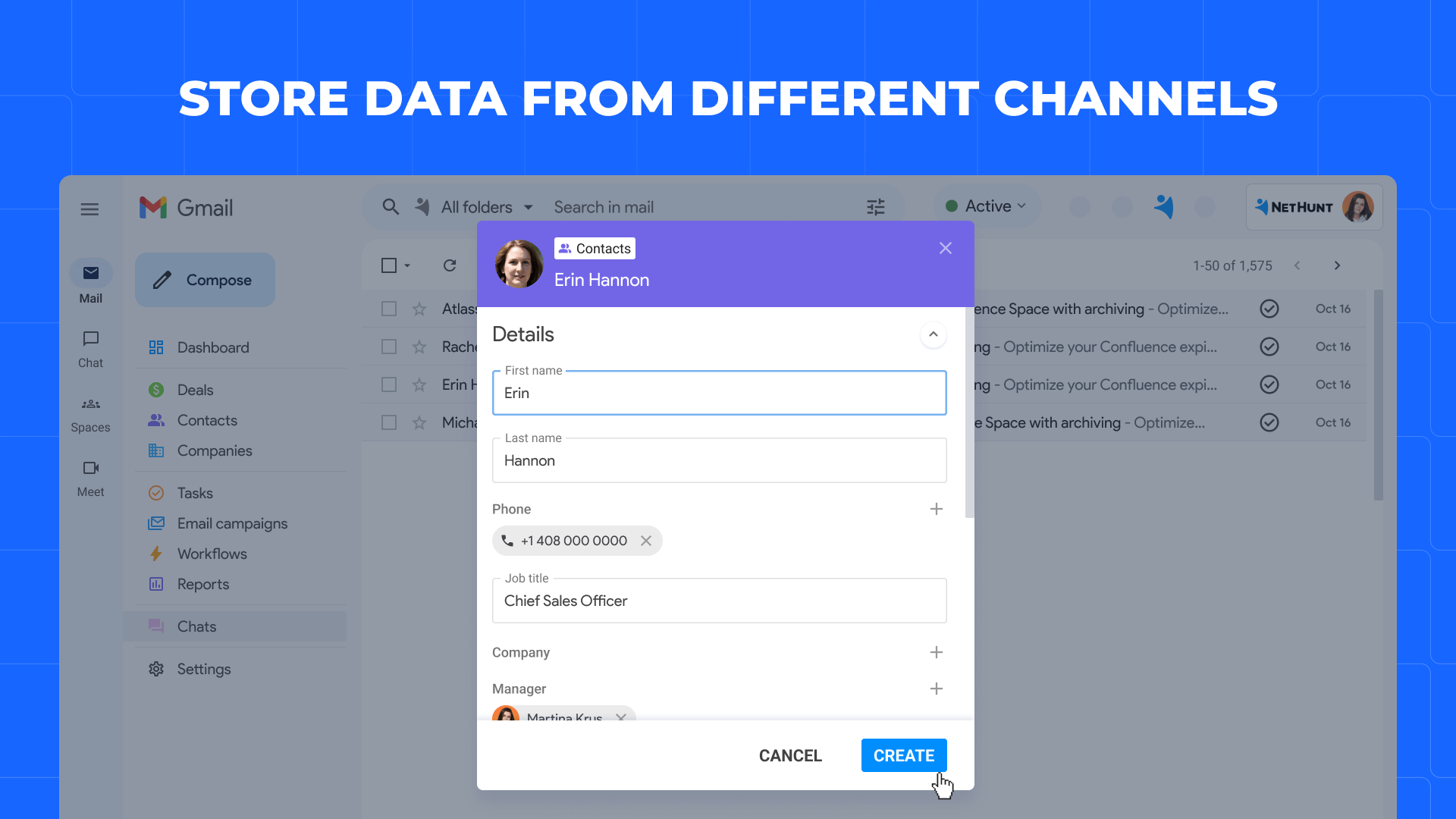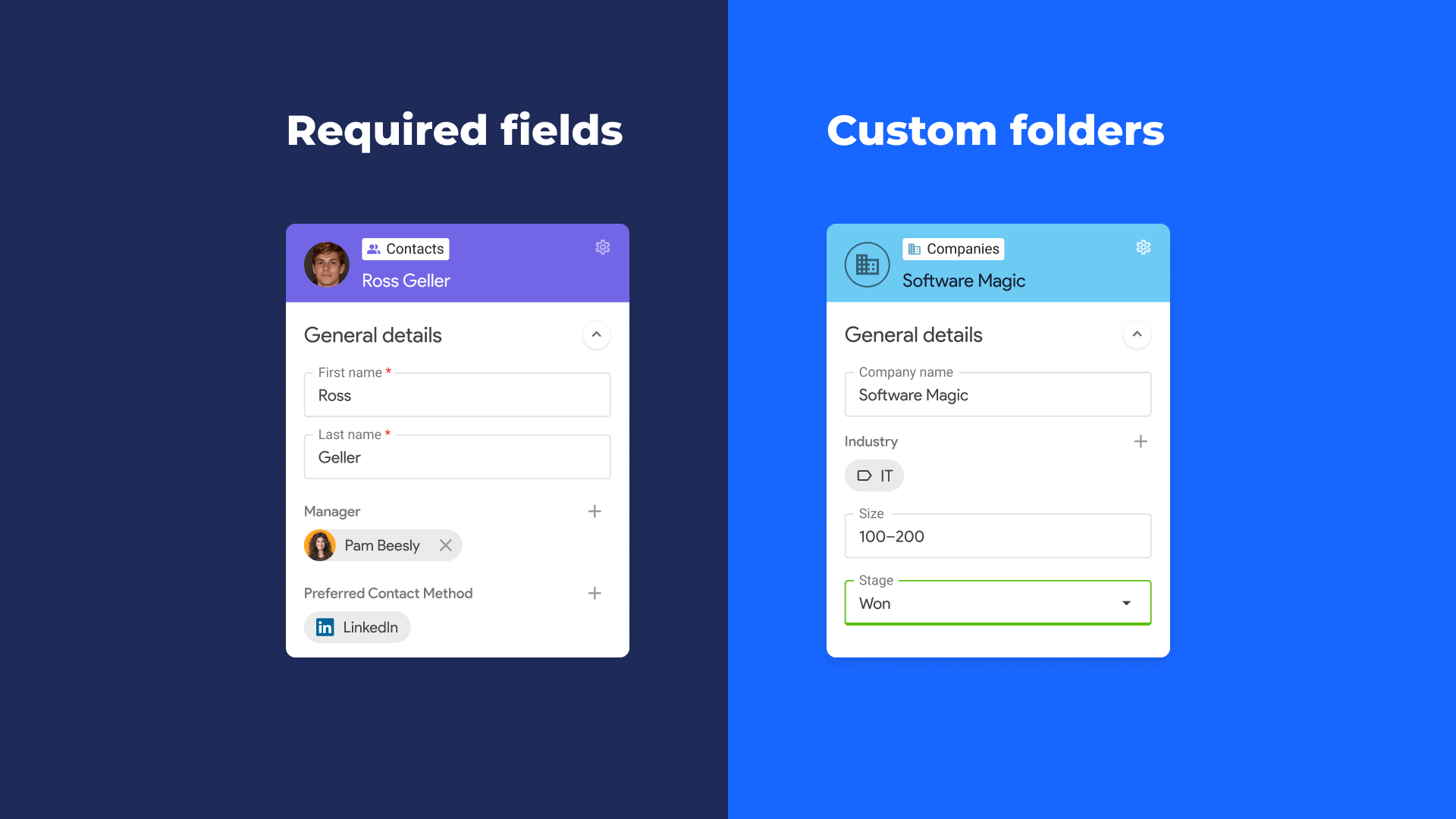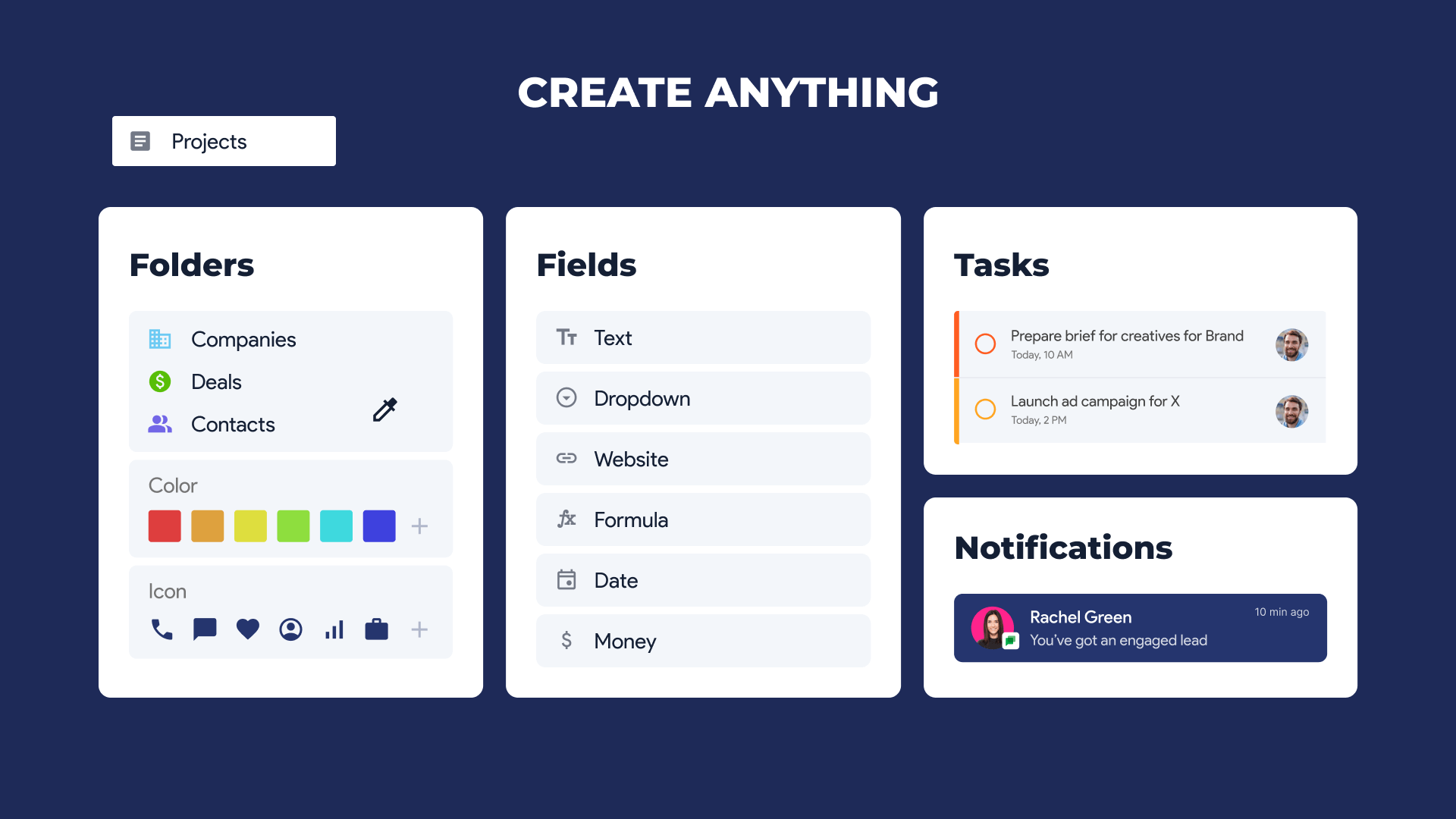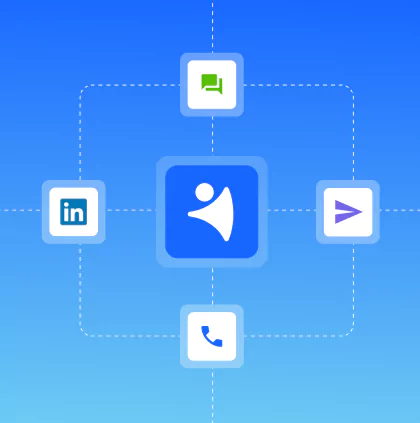Intro
Managing customer interactions is getting more complex by the day. Phone calls, emails, social media messages, and face-to-face meetings — juggling these channels can feel like a circus act. The real challenge? Data silos and disconnected information that prevent you from seeing the full picture of your customer relationships.
All of this can become a thing of a distant past with a well-chosen and effectively implemented CRM solution.
Why does a business need a CRM system? According to NetHunt’s clients 100SYSTEMS, a CRM solution can drastically boost sales — the company saw a 30% increase in sales within just one year.
Find seven more ways how your business can benefit from a CRM solution in this article.
Top 8 Reasons Why Your Business Need a CRM System
So, why do you need CRM? In a nutshell, the importance of CRM to businesses lies in its ability to align the work of different departments, streamline processes and make data collection and management more effective.
But let’s look at the benefits CRM brings to businesses in more detail.
Centralized customer data
In today’s cutthroat market, leveraging every available opportunity is crucial. That’s why the omnichannel approach to lead generation is a winning strategy for landing more deals.
Website forms, email, cold calling, social media like LinkedIn and Instagram, digital and offline ads, event marketing—you name it, it's in play. It’s the more, the merrier kind of situation.
But here’s the kicker: juggling all these channels can lead to missing out on crucial details, ultimately hindering your sales success.
Clients might message you on LinkedIn, then send documents via email, and schedule calls to discuss details. If it's just a few clients, it's manageable, but when your pipeline is brimming with opportunities, you risk spending ages piecing everything together.
Now, imagine different salespeople working on the same deal. Without centralized data, critical information can get lost, duplicated, or overlooked, leading to an absolute chaos of a sales process.
This is why CRM is required. It acts as a single hub for your customer data, providing you with a complete, 360-degree view of each customer. You can see their interactions across all touchpoints, understand their needs better, and personalize your approach.

Moreover, with all the data centralized in one place, you can easily access required pieces of information. Instead of rummaging through notes scattered across digital and physical notebooks, spreadsheets, and various apps, you have everything you need right at your fingertips.
Cleaner, more reliable customer data
Data centralization isn’t the only thing making CRM important. A CRM solution helps standardize data entry, drastically improving the quality of your database. When you use CRM software you can expect cleaner, more reliable data to work with, ultimately boosting your bottom line.
Increased data completeness
When your sales team relies on spreadsheets, it's way too easy to miss crucial data—whether they forget to jot it down or think some details don’t matter. But let’s be real: even the tiniest overlooked info can set your business back miles when it's time to close deals.
In systems like NetHunt CRM, you can customize customer records with required fields. New deals or contacts won’t be created unless all necessary information is provided.

No data duplicates
For larger sales teams or companies with multiple reps working on the same deals, duplicate data can be a real issue. A CRM with duplicate prevention, such as NetHunt CRM, identifies and merges or deletes repeat entries, ensuring a cleaner database.
Consistent data format
Even if your salespeople diligently keep track of their details and customer details (high five if they do!) inconsistent data formats can still cause problems.
For instance, reps might record a lead’s name as "First Name, Last Name," "Last Name, First Name," or not separate them at all. This inconsistency can wreak havoc when personalizing emails through Mail Merge, resulting in "Dear Harry," "Dear Potter," and "Dear Harry Potter"—wildly different in the world of cold emailing.
And that’s just a minor inconvenience compared to inconsistent recording of lost deal reasons. "No money," "broke," and "too expensive" might mean the same thing, but without data unity, reports won’t show the bigger picture. Even if you try to merge the variations in your spreadsheet database, typos won’t be highlighted with a simple Ctrl+F.
Uniform data formats make processing and reporting a breeze — and that’s why CRM is important for business.
Better productivity and efficiency of the sales team
According to research by InsideSales.com, salespeople spend just 37% of their time actually selling. The rest? It’s often wasted on admin tasks like data entry, sending out email sequences, moving deals from one pipeline stage to another and updating the task log.
CRM software automates these tasks, letting sales reps focus more on selling. ANd here’s some food for thought: high-performing companies are twice as likely to have automated sales processes, according to Teamgate.
Download free sales automation playbookAnother CRM feature that has a positive impact on the sales team productivity is the task management functionality the majority of great CRM solutions offer. Sales reps can track their to-do lists, set follow-up reminders, and prioritize tasks. No more missed follow-ups or disorganized sticky notes—everything is handled within the CRM.

Finally, the importance of CRM to businesses is difficult to understate for sales managers. With a CRM, they gain clear visibility into their team’s activities. They know exactly what everyone is working on and can track progress in real-time. This ensures accountability and helps keep everyone on target.
Increased collaboration across departments
A CRM system isn’t just for sales—it’s a game-changer for the whole company that bridges the gap between different departments, namely sales and marketing. It puts everyone on the same page, ensuring all parts of the business work toward achieving common goals.
With CRM data, marketing specialists can fine-tune customer personas and launch more personalized campaigns to attract higher-quality leads. They can track what works, see what generates leads, and adjust strategies on the fly.
Using insights from sales and customer success teams stored in the CRM, marketing can create targeted retargeting ads, hitting the right audience and increasing conversion chances.
CRM software also streamlines lead qualification, ensuring only the best leads reach sales, saving time and boosting efficiency. Sales reps can see which landing pages and ads brought in leads and personalize their approach to nurture and close deals effectively.
All of this becomes possible thanks to the shared database accessible to specialists from different departments, advanced collaborative functionality like tasks, @mentions, comments, and more.
Better customer experience and increased customer satisfaction
A report by Zendesk claims that over 50% of customers would ditch a company after just one bad experience.
With so many options available to consumers these days, it’s vital to invest in top-notch customer experience if you want to make sales and keep your customers coming back.
A CRM system can significantly enhance the customer experience and boost customer satisfaction levels in a number of ways:
- Faster response times: 50% of leads tend to do business with the company that responds first. In fact, responding within the first minute increases lead conversions by 391%. CRM software speeds up response times for new leads and customer queries, ensuring prompt and efficient service.
- Faster problem resolution: According to a report by Accenture, 89% of customers feel annoyed when they have to explain their problems to multiple customer service representatives. Since all the previous interactions are recorded in the customer record in the CRM, customer success managers don’t have to waste time trying to figure out the nature of the customer’s query and can offer a solution in just a fraction of time.
- Elimination of redundant outreach: CRM minimizes the risk of sales reps accidentally reaching out to the same customers or missing details from previous interactions.
- Standardized onboarding: Particularly important for SaaS business, CRM makes the onboarding process smooth and unified, helping customers quickly reach that "aha!" moment when they see the value of your product or service.
- Personalization at every stage: CRM data allows for personalized marketing campaigns, tailored sales offers, deeper bond with customers, and more relevant upselling and cross-selling throughout the customer journey.
- Consistent communication: A report by Zendesk reveals that over 35% of customers expect to contact the same customer service representative through any channel. A CRM ensures consistent communication across all channels, making customers feel valued and understood.
A great example of how CRM software can increase business efficiency is Web-systems Solutions, a Ukrainian IT company. As a result of implementing NetHunt CRM, they managed to increase their lead generation efficiency ten-fold thanks to the LinkedIn integration and lead processing speed by 300% thanks to automations.
Learn more about Web-systems Solutions’ journey with NetHunt CRM in the case study.
Better customer retention
A happy customer is a customer that stays with your business longer and keeps coming for more.
We’ve already figured out how CRM software can help your business maintain high levels of customer satisfaction. But there’s something else a CRM system can do.
A reliable system filled with up-to-date data can help you reduce customer churn, further increasing the importance of CRM solutions for business.
With CRM software, you can…
- Spot signs of potential customer churn early on and act accordingly.
- Automate assessment call scheduling to meet expectations.
- Automate subscription renewal reminders.
For example, in NetHunt CRM, you can create custom views and track customers that are in the high-risk zone:
- Those exporting their data
- Those not using the system for a certain amount of days
- Those not interacting with your communication
- Those not logging into your product, etc
When a new customer enters the view, you receive a notification and can act before it’s too late.
Data-driven decision making
In overcrowded markets, where every little detail matters, businesses don’t have the luxury of basing their strategy on guesswork. Every decision you make needs to be backed by hard numbers.
Why are CRMs important? They provide the much-needed data for sales planning, sales forecasting and sales reporting.
Thanks to the data presented in the CRM system, you can track your sales performance and measure success, then form a report and easily share those insights with your team and stakeholders.
With correct, complete, and up-to-date data in your system, you can accurately forecast future sales. Knowing the revenue you're aiming to generate allows you to budget and allocate resources accordingly, ensuring your sales team has what they need to succeed.
Finally, the CRM data gives you a chance to pinpoint stages in your sales process where deals often stall. You can then proactively address those bottlenecks and improve your sales pipeline efficiency.
All things considered, companies need a CRM since it allows them to prioritize resources, focus on high-performing areas, and address weaknesses with confidence, leading to better business outcomes.
Increased sales
A CRM helps you capture, organize, and track leads efficiently.
Moreover, customer relationship management can help a business to identify its highest-value leads and focus sales and marketing activities on successful acquisition and retention of those. As a result, companies don’t just increase sales, but also increase the average deal size.
For instance, Recom, a French B2B company that specializes in commercial prospecting, managed to achieve a consistent increase of +20-25 new qualified sales leads per month and boosted its customer base five-fold after implementing NetHunt CRM. This became possible through their active use of task management functionality (they automated task reminders to make sure no deals remain unattended), sales automation functionality, and the tight-knit integration of the system with Gmail.
Learn more about Recom’s challenges and gains in the customer story.
Common Objections to CRM Implementation
Despite the numerous benefits of CRM software, a lot of companies still use spreadsheets and tools not suitable for customer data to keep track of their deals.
Let’s discuss a few common reasons why companies are reluctant to implement CRM software and debunk them.
- High initial costs: Many worry about the initial investment, but CRMs are designed to save money in the long run. According to Nucleus Research, for every dollar spent on a CRM, the average ROI is $8.71. Besides, the CRM software market is full of affordable cloud based CRM solutions, where you only pay for the features you need.
- Complexity of the system: Some fear CRM systems are too complex and that training will be a hassle. The truth is modern CRMs are user-friendly and come with extensive support and training resources, drastically flattening the learning curve.
- Data security: Data security is a valid concern, but reputable CRM providers offer robust security measures. Encryption, regular backups, and compliance with data protection regulations ensure your customer data is safe.
- Integration with existing systems: Integrating a CRM with existing business tools can seem daunting, but most modern CRMs offer seamless integration capabilities. Whether it’s your email marketing platform, ERP system, or social media tools, CRMs are built to work with your existing software, ensuring a smooth workflow.
- Customization and flexibility: Businesses often worry that a CRM won’t fit their specific needs. Most CRMs are highly customizable, allowing you to tailor workflows, fields, and features to match your business processes.
Finally, one of the most stubborn objections is resistance to change within the company. Employees accustomed to traditional methods might resist switching to a CRM and sabotage any plans related to the CRM implementation.
However, if you manage to motivate your team to actually use CRM software, you’ll be able to reap the benefits and reach your business goals.
Are You Ready to Elevate Your Business with a CRM Solution?
After careful consideration, you should understand the importance of CRM systems for business and be thrilled to start your search for the perfect solution for your business.
Remember, when you choose a CRM system for business, shop around and look for a solution that fits your specific business needs. Then and only then will you be able to leverage the benefits of the system you implement.
Give NetHunt CRM a try



















 product experts — let's find the best setup for your team
product experts — let's find the best setup for your team